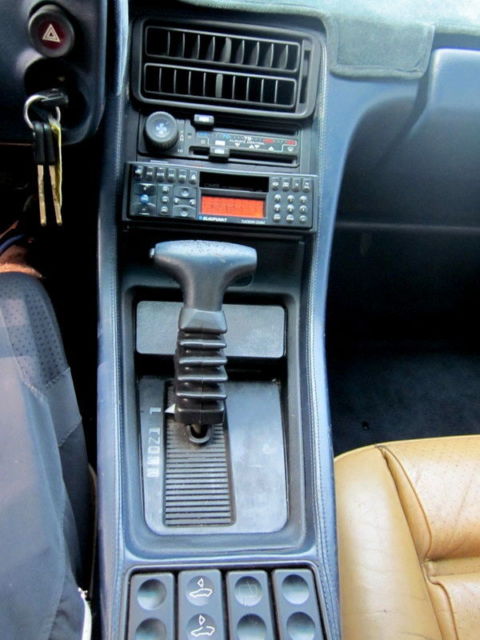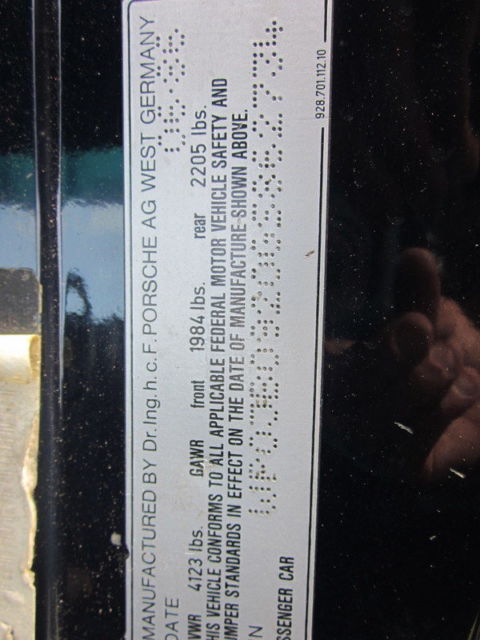1986 Porsche 928 S 2dr Hatchback -Ready to drive.... FULL MAINTENANCE RECORDS
- Price:
- Location: Cocoa, Florida, United States
- Make: Porsche
- Model: 928
- SubModel: HATCHBACK
- Type: HATCHBACK
- Year: 1986
- Mileage: 92,000
- VIN: WP0JB0920GS862734
- Color: Blue
- Engine size: 5.0L NA V8 double overhead cam (DOHC) 32
- Number of cylinders: 8
- Fuel: GAS
- Transmission: Automatic
- Drive type: RWD
- Vehicle Title: Clear
1986 Porsche 928 Description
This vehicle is eligible for up to $50,000 in Vehicle Purchase Protection in the event that you never receive after you have paid for it or sent a refundable deposit.To qualify for Vehicle Purchase Protection you must be the winning bidder or an auction or click the Buy It Now button directly on the eBay site. Additional eligibility may apply.Please refer to the full terms, conditions and restrictionsCONTACT J R 321 872 4285 FOR MORE INFO OR TO BUY THIS CAR NOW
VEHICLE VALUATIONS HERE COURTESY OF HAGERTY.COM1986 Porsche 928 S2dr Coupe 8-cyl. 4644cc/234hp Bosch FI$17,300Avg. Value*Only $361 per year to insure this classic with Hagerty** – that's less than $185 every 6 months.Quote Your Classic
Prefer doing business in person?Connect with an agent in your area
Jump To:- Current & Historical Values
- Vehicles for Sale
- VIN Decoder
- Articles & Videos
Engineers were given free rein to "invent" the newest Porsche, and plans for the 928 began in October 1971, with a basic design finalized in 1972. And what a design it was, especially within the walls of a company that had in its 30-year history built nothing but cars with a small engine placed behind the driver. But if America was the target market, a front-engined, rear-wheel-drive V8 Grand Touring car certainly made sense.
The 928 debuted in March 1977 at the Geneva Auto Show, and while Porsche purists bristled at the thought of such a pedestrian layout, the new car received much acclaim. The $28,000 928 borrowed no parts from other Porsches, and its shape was like nothing else--a futuristic design with a low, wide stance, a long, sloping hood, a sharp nose, and an evenly rounded rump. "Telephone dial" wheels completed the package. At the time, design head Tony Lapine stated that "a car which is liked immediately will not hold up over time." Porsche had designed a long shelf life into its latest creation, and at the same time had handsomely incorporated 5-mph safety bumpers front and rear.
The body made use of collapsible polyurethane pieces over front and rear hidden bumpers, with aluminum doors, hood, and front fenders, and steel for the remaining panels. Though now commonplace, at the time, trying to coat such differing materials with a uniform paint job was a feat of ingenuity.
Beneath the handsome and complicated skin lay an advanced and well-balanced powertrain. A 90-degree, all-aluminum, 16-valve, 4.5-liter V8 with Bosch Continuous Injection System (CIS) fuel delivery produced 219 hp and 254 ft-lb of torque. It was mated to a fully synchronized rear transaxle with either a 5-speed manual or optional 3-speed automatic, and weight distribution was nearly perfect at 51%/49%, front to rear.
Suspension was fully independent all around, and Porsche worked hard to perfect the 928's rear suspension, which would allow it to accommodate over-aggressive drivers without the erratic tendencies of snap oversteer. The resulting "Weissach Axle" was an engineering breakthrough, a multi-link setup that made the 928 one of the best handlers in the world.
The cabin was nothing short of plush, with supportive leather seats, an ingenious tilt steering/instrument binnacle, and all the comforts of a true luxury GT. And it could move, too, with 0 to 60 mph coming in just over 7 seconds, with a top speed over 135 mph. By the time the 4.7-liter 928 S arrived in 1983, the car was rated at 146 mph, making it the fastest in America.
Displacement, power, and top speed increased as production continued, with a 5.0-liter appearing in 1985, as well as revised brake and suspension components and a 4-speed automatic to replace the 3-speed. A 928 S4 debuted in 1987, now with 316 hp, and a 928 GT entered the fold in 1989, complete with a limited-slip differential and available only with a 5-speed. The 928 GTS replaced both the S4 and GT for 1993. It featured freshened bodywork and a bigger 5.4-liter engine now putting out 345 hp and capable of 170 mph. It also cost nearly $85,000.
By this time, the 928 had practically disappeared from the American market. Sales had fallen dramatically, and Porsche redoubled its efforts on the 911, which had weathered the regulatory storm mostly unscathed.
In all nearly 61,000 928s were built during the car's 17-year tenure. Even by today's standards, it is a competent, comfortable GT, and a well-sorted one will offer plenty of high-speed thrills over continental distances.
">By the early 1970s, it was clear that increasingly tough and complicated emissions and safety regulations were going to change the American automotive market’s landscape. And since America was Porsche's biggest market, higher-ups reasoned it was only a matter of time before such restrictions hampered the sales appeal of their 911. By developing an entirely new Porsche, one with all the latest federal regulations already incorporated, Porsche hoped to meet the new standards head on. In the meantime, if the Stuttgart company had to kill the 911 because of such standards, it would be prepared to transition.
Engineers were given free rein to "invent" the newest Porsche, and plans for the 928 began in October 1971, with a basic design finalized in 1972. And what a design it was, especially within the walls of a company that had in its 30-year history built nothing but cars with a small engine placed behind the driver. But if America was the target market, a front-engined, rear-wheel-drive V8 Grand Touring car certainly made sense.
Show All...1986 Porsche 928 S Info- 0" >
- Body Styles
- 2dr Coupe
- 0" >
- Engine Types
- 8-cyl. 4644cc/234hp Bosch FI
- 8-cyl. 4664cc/310hp Bosch FI
- 8-cyl. 4957cc/288hp Bosch LH-Jetronic FI
- #1 Concours$43,400Condition #1 vehicles are the best in the world. The visual image is of the best vehicle, in the right colors, driving onto the lawn at the finest concours. Perfectly clean, the vehicle has been groomed down to the tire treads. Painted and chromed surfaces are mirror-like. Dust and dirt are banned, and materials used are correct and superbly fitted. The one word description for #1 vehicles is "concours."
- #2 Excellent$26,100
- #3 Good$17,300
- #4 Fair$8,900
-20% for auto.
- About Hagerty's Condition Ratings
- |
- About Our Prices
- 3 YEAR
- 5 YEAR
- ALL
 1982 Porsche 928 S-Runs/Drives GREAT!! Full Maintenance Records-Excellent
1982 Porsche 928 S-Runs/Drives GREAT!! Full Maintenance Records-Excellent
Mileage: 89,012
 1972 Porsche 911T - Excellent Condition - Detailed Records - Ready to drive
1972 Porsche 911T - Excellent Condition - Detailed Records - Ready to drive
Mileage: 143,000
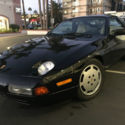 1990 Porsche 928 S4, collector owned, maintenance records, California garaged
1990 Porsche 928 S4, collector owned, maintenance records, California garaged
Mileage: 121,481
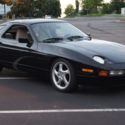 1988 Porsche 928 928S4 Black Tan Leather Southern Car Maintenance Records
1988 Porsche 928 928S4 Black Tan Leather Southern Car Maintenance Records
Mileage: 139,000
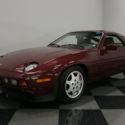 ONLY 37K ORIGINAL MILES, WARRANTY CARD & MAINTENANCE RECORDS, NICE 928S PORSCHE
ONLY 37K ORIGINAL MILES, WARRANTY CARD & MAINTENANCE RECORDS, NICE 928S PORSCHE
Mileage: 37,662
 1986 Porsche 928S - Clean Carfax, No Accidents, All Maintenance Done!
1986 Porsche 928S - Clean Carfax, No Accidents, All Maintenance Done!
Mileage: 51754
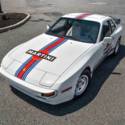 1986 Porsche 944 Base 2dr Hatchback 97105 Miles White Hatchback 2.5L I4 Manual 5
1986 Porsche 944 Base 2dr Hatchback 97105 Miles White Hatchback 2.5L I4 Manual 5
Mileage: 97,105
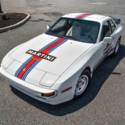 1986 Porsche 944 Base 2dr Hatchback 96105 Miles White Hatchback 4 Cylinder Engin
1986 Porsche 944 Base 2dr Hatchback 96105 Miles White Hatchback 4 Cylinder Engin
Mileage: 96,105
 1993 Porsche 911 RS America in Black / Full Service Records / Must See / 964
1993 Porsche 911 RS America in Black / Full Service Records / Must See / 964
Mileage: 54,905
 1992 Porsche 964 Carrera 2 Coupe C2 full service records clean car fax
1992 Porsche 964 Carrera 2 Coupe C2 full service records clean car fax
Mileage: 78,590



